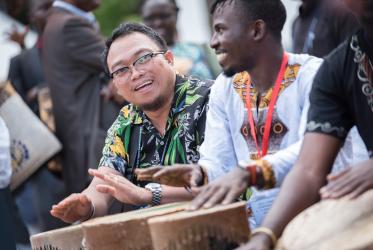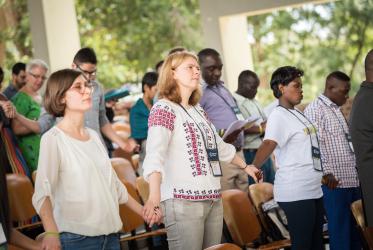Rt Rev. Dr Samuel Amirtham, an internationally renowned theologian, bishop and ecumenical leader, passed away on 26 September at the age of 85.
Amirtham was a multifaceted and charismatic teacher, pastor, leader, and revolutionary, inspiring and accompanying many lives, from remote villages to universities, to the corridors of power.
Amirtham was director of the Programme on Theological Education and worked at the World Council of Churches (WCC) from 1980 to 1990.
Remembering his contribution to the ecumenical movement, Rev. Prof. Dr Dietrich Werner, Senior Advisor for Theology, Ecumenical Education and Research at Bread for the World – Protestant Development Service, said, “During this period, Dr. Amirtham also pioneered important international study processes on spiritual formation in theological education (Iona consultation), the teaching of ecumenics (Bossey Seminar), as well as ecumenical and global learning in European theological education institutions (Herrnhut consultation). He inspired many younger ecumenical scholars during his work in the WCC and in Bossey.”
Rev. Dr Isabel Apawo Phiri, Associate General Secretary for Public Witness and Diakonia, is one of the younger scholars who were introduced to the ecumenical movement as a youth commissioner to the Commission for the Programme on Theological Education in the 1980s.
Over and beyond the leadership he provided to theological education, Amirtham, with Cyris H. S. Moon, pioneered new concepts in teaching ecumenism internationally and also promoted and published, with Rev. Prof. Emeritus Canon J.S. Pobee, innovative approaches for doing theology in their work Theology by the People: Reflections on Doing Theology in Community.
Amirtham was consecrated as the fourth bishop of the South Kerala diocese of the Church of South India (CSI) and led the people of the diocese from 1990 to 1997.
Bishop Amirtham lived out his theology in the way he related to people who are different, said Pobee. “Amirtham guided the thrust on ‘theology by the people,’ by leading the PTC to pursue programmes regarding theological education by extension, and by fundamentally ensuring the democratization of theological education. Theology could no longer be the monopoly of the selected exclusive few; it is the occupation of the whole people of God.”
Rev. Dr Ofelia Ortega Suárez, former president and officer of the WCC, sees herself as a “friend, companion and disciple of this admirable man.” She remembers: “My meeting with Samuel Amirtham was a continuous inspiration for my life. Working with him in the theological education programme of the WCC, I was able to receive his wise guidance in understanding and putting into practice the contextual theological education that can bring about transformation and change in our churches and in society. In addition, I discovered in Samuel Amirtham a man capable of dreaming at noon with his eyes wide open, and able to make those dreams come true in actions identified with the suffering of the most impoverished and vulnerable people. He taught us to see the crucified ones as God's favourites.”
Ortega continued, “He had this ability not only to remain spiritually open to the new, but also to be able to initiate the new with the support of the younger generations. He worked with us forming, delegating, and always passed the torch to those who were emerging with unparalleled generosity. I have always been struck by the way in which those dreams that helped to build the new were always accompanied by a simple lifestyle, where love for their homeland and the Global South were always the foundation of his theological reflections. To God be the glory! for allowing us to share the friendship and work of this ecumenical leader who today is part of the long list of our ancestors who lived by faith (Hebrews 11: 1).”
A native of Parassala, Kerala, India, Amirtham began his journey of working in the service of the church in 1957. In 1969, he was appointed the first principal of the Tamil Nadu Theological Seminary in Madurai. He introduced the gurukulam model of community living at the seminary, where the students and teachers worship together, stay together, grow together, serve and theologize together as one community. He promoted community living and a pilgrim model of learning, which involved students participating in the life of the neighbourhood, in the context of the struggle for survival. He was also dedicated to promoting contextual theological reflections in dialogue with local traditions in the form of creative writing and songs.
Bishop Amirtham believed that the practice of one's faith is a corporate act of all people of God and that it is imperative for the church and Christian life to be relevant and responsive to the needs of the community they live in. He was successful in establishing several charitable institutions for the welfare of the people who are marginalized in society. The Palmyrah Workers Development Society, formed by him in 1977, undertook the task of assisting and accompanying marginalized palmyrah workers and climbers of the South India.
“The WCC and the ecumenical family throughout the world share the grief of this great loss. Our prayers and thoughts are with his life partner and pillar, Lilly Amirtham, and their two children, Arun and Asha, their grandchildren, the wider family and friends and the church. We pray that they are accompanied by the peace and love of our Lord, during this time of bereavement,” said the Rev. Dr Olav Fykse Tveit, general secretary of the World Council of Churches.
“The immense contributions of Rt Rev. Dr Samuel Amirtham for the uplifting of marginalized people, for the growth of the church and the wider ecumenical movement, will remain a great witness to his exemplary leadership and will be a great inspiration for generations to come.” concluded Dr Manoj Kurian, Coordinator of WCC-Ecumenical Advocacy Alliance.







